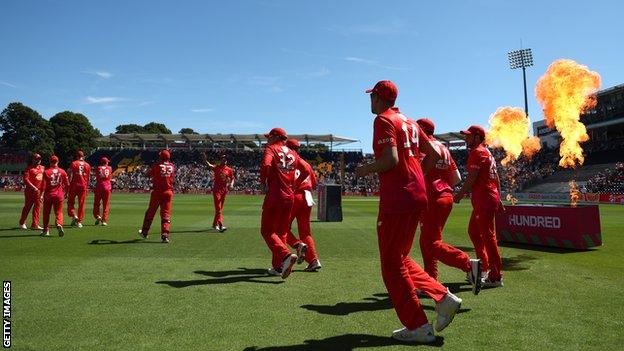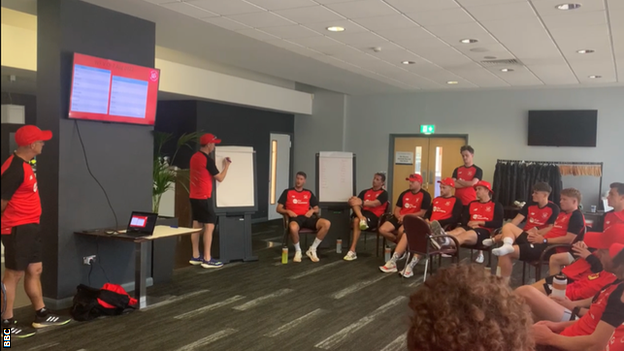The Hundred: BBC Sport goes behind the scenes with Welsh Fire
- Published

Welsh Fire hosted Oval Invincibles at Sophia Gardens on Sunday
BBC Sport was given exclusive access behind the scenes for three days before and during Welsh Fire's match against Oval Invincibles in The Hundred.
Welsh Fire's players file into a function room at Sophia Gardens.
It is three days since they were thrashed in the first game of The Hundred and 24 hours before their second match against Oval Invincibles.
Cricketers are notorious for disliking meetings, to such an extent the Fire have decided not to call them meetings.
At the front of the room are two flipcharts. Sat beside them is Fire head coach Gary Kirsten and next to him is the team's performance coach and Kirsten's right-hand man, Tom Dawson-Squibb.
"Can the first three batters from the last game stand up?" asks Dawson-Squibb to begin.
Slightly reluctantly, up step Tom Banton, Joe Clarke and Ollie Pope, followed by their opponents, three bowlers.
"We're going to start with the game."
The players take turns to try and spell a word backwards - first magnificent, then tremendous. Neither attempt is successful.
Next Kirsten, the former South Africa batter and a World Cup-winning coach with India, speaks, beginning with a look back on the defeat against Southern Brave in the opening game.
The 54-year-old is calm. He holds the room with the players sat in a semi-circle in front of him.
He flicks through a powerpoint presentation that highlights some of the team's problems from the defeat, when they managed just 107 runs batting first.
"Any comments on our batting?" he softly asks the players who are all dressed in Fire training kit - some with additional bucket hats.
There's an awkward pause. Eventually England batter Pope breaks the silence as eyes elsewhere look around and down.
"It's not how we wanted to start but we don't want to dwell on it," he says. "Those shots can come off on another day."
The Fire squad are far more comfortable when, after the initial review, they split into smaller groups to discuss the strengths and weaknesses of their next opponents - the room now a sea of people shadowing shots or deliveries.
After 15 minutes they come back together to talk as a group.
"His get out of jail is the yorker under pressure," is one opinion of an Invincibles bowler who was a team-mate of one of the Fire elsewhere.
When the discussion turns to one of the Invincibles best batters, Rilee Rossouw, the feedback is: "Don't bowl the same ball twice. Don't wait to bowl wide at him. You frustrate him straight away. Bowl wide hole [a wide yorker]."

Fire lost to Southern Brave by nine wickets in their first match of The Hundred last week
Throughout the conversation Kirsten pushes the discussion but does not set out specific plans or tactics. Australia spinner Adam Zampa and England seamer Jake Ball are two of the most regular speakers.
Also in the room is the Fire's data analyst, Ben Jones.
He largely takes a back seat but when the suggestion is made to bowl slower balls to Rossouw he points out the South African has one of the best records against such deliveries in the world.
"Oh," is the response, with a few wry smiles around the room.
As the meeting continues, tension builds around the use of data analysis. Where does the data say they should bowl? Should the players think for themselves?
Some stay quiet. Some are keen to know the numbers but when, after around 40 minutes, Kirsten brings the meeting to a close, others seem to feel too much time has been spent worrying about the opposition.

Earlier that day David Miller, the Fire's star overseas batter, joined up with the squad after missing the first match as he was on international duty with South Africa.
He meets some of his team-mates for the first time on the team bus on the way to training.
Miller breaks the ice: "So how was the first game lads?"
Otherwise the bus is quiet - players at the back, coaches at the front - apart from Kirsten, who rides the 15-minute journey from the plush team hotel at Cardiff Bay to the stadium on a bicycle.
On arrival Miller finds his home in the dressing room in one of the few available spaces, a sofa in the middle of a room otherwise covered by bags, bats, helmets and other cricket kit.
The rest of the squad only entered the dressing room for the first time 24 hours earlier - the nature of The Hundred meaning Welsh Fire take over a room usually occupied by Glamorgan.
As each player arrived there was a tentative look around before picking their spot. Josh Cobb, Fire's quiet and understated captain, in the corner and the rest roughly split with batters on one side and bowlers the other.
They eat in a small, windowless room. One group sit around a phone watching the Fulham-Liverpool Premier League match with fantasy football adding extra motivation.

With less than an hour to go before the match, Kirsten brings the players together on the outfield. "Be aggressive," he says as he leads a team talk.
Tactical discussion is kept to a minimum.
Cobb has already been given a 'captain's pack' of data by the analyst.
It is simple and colour-coded. Green signifies a match-up in Fire's favour and red one to avoid, such as Invincibles batter Sunil Narine against spin because of the destructive way he attacks slow bowling.
With Fire in the field in the first innings, the dugout are relaxed at first - helped by a good start with the ball.
"If we get him with a slower ball I'm walking home," jokes Jones, as Rossouw, the player discussed more than any other in the team meeting, enters the action early.
He cracks his third ball for four - cue nervous tension - but then he gets a thick edge to a full, wide delivery next up and is caught.
"Wide hole!" shouts one of the coaches on the bench. It's a plan perfectly brought together - even if not quite as expected.
But as the innings goes on Fire are pushed on to the back foot by opener Will Jacks, who hits 81 from 45 balls.
The Hundred - Welsh Fire v Oval Invincibles: Jacks attacks & acrobatic fielding
Kirsten stands just outside the dugout throughout and watches alongside Dawson-Squibb.
Fire concede 63 from the last 20 balls and the Invincibles power to 158-5, a challenging score.
The dressing room is hushed, batters scrambling to find kit. There is no time for speeches or a rallying cry.
"Be busy," Kirsten says to Pope as he wanders around to have a word in the ear of each batter.
Bowler David Payne offers further advice. "Give yourself time," he says to Pope. "The ball is not gripping or anything."
Kirsten makes his first tactical call 15 balls into the chase. He turns to Pope and Ben Duckett, both padded up in the dugout to bat next, and tells the latter to bat next if a wicket falls to get a left-hander at the crease.
But the Fire chase starts to unravel. First Tom Banton departs, then Joe Clarke returns, shaking his head having been caught.
The analyst offers occasional observations to Kirsten but the bench falls quiet - very quiet - with eyes fixed ahead on the field.
Kirsten moves from his seated position to stand by the dugout but any emotions bubbling beneath are not visible behind a straight-faced expression, dark sunglasses and red Fire cap.
Fire lose by 39 runs - their second successive defeat.
It's almost an hour after play when Kirsten speaks to the players, who have spent time signing autographs and posing for selfies.
The room is silent. Kirsten remains calm.
"We all know it's not nice losing," he says. "This is not me standing up and saying it is unacceptable.
"It is us standing up and saying we can do better. When we come back we have to be better versions of ourselves."
Welsh Fire will hope to do that in their third match against Birmingham Phoenix in Saturday.
Whether Kirsten's calmness will be tested in the coming weeks remains to be seen.

How can you save money on meat? Here are some helpful tips on reducing your spend
Why are some people still unvaccinated? Hannah Fry meets some of them to find out the reasons
